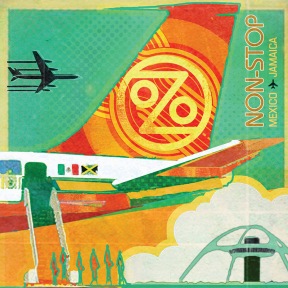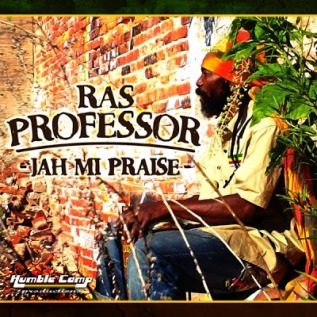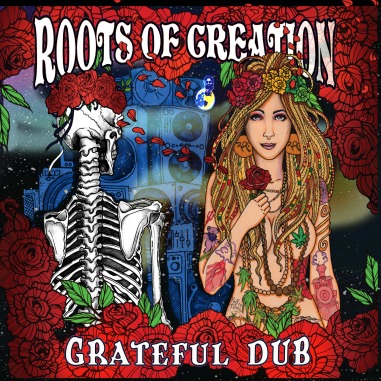
For over twenty years, Ozomatli has been a hard touring act, although their roots in southern Los Angeles has brought sounds of cumbia, hip-hop, reggae, funk, rock, and more across the states and world. Oftentimes, the sound is straight-up fun, but the messages are usually sociopolitical, the execution positive.
Recently on tour with Chali 2na rapping again, Ozomatli has entered yet another renaissance; the group’s ability to evolve and grow is inspirational. For their performance at Cali Roots 2018, Ozo drove up from L.A. the day of their set, and Ulises Bella (saxophone) and Asdru Sierra (trumpet, lead vocals) rushed to our interview, quickly finding their pace and relaxing into the Monterey vibes.
Seems like you have a lot of interviews coming up. Do you know how many you have?
Ulises: Right now, only you, I think.
Asdru: There’s six of us, so we’re spread around.
Cali Roots seems like a fitting place for Ozomatli.
Ulises: I think this is our first time doing it… Yeah. We’ve done a lot of reggae festivals over the years. We’re always the non-reggae act that’s acceptable for these kinds of festivals. [Laughs] I think it’s because we bring a lot of energy; we’re fucking with a lot of dance music from all over.
And I think your message is fitting of the scene.
Ulises: For sure.
I know your most recent album [Non-Stop Mexico → Jamaica] focuses on reggae, so I didn’t know if you were going to go that route for your set.
Ulises: You know, that album is already kind of a year old, so we might do some of it. The thing is exactly that: we’re at a reggae festival, so like, should we play reggae? Or should we stand out by doing something a little different? But that particular project was a departure from what we usually do, taking really famous Spanish songs, new and old, and giving them the reggae treatment. What really pushed it over the edge was getting Sly and Robbie to play on it. 
What was it like to work with them?
Ulises: Well, what was that single we did with them?
Asdru: We were on one of their records; it was called “Affinity”. We hit it off since then.
Well, it seems that taking care of equipment and everything, the crew here is helpful.
Asdru: Super nice. [To Ulises] Did you get that sweater for free?
Ulises: Yeah.
Oh, yeah, that’s a Cali Roots sweater.
Ulises: This guy just got a free sweater! See how nice these motherfuckers are?
Asdru: The artist’s name was Bal or Tal, or Tavy… Damn, I forget his name! He said his dad brought him to one of these festivals and I got to talk to him, that I rolled up here and wanted to buy one of his sweaters, and he said, “Oh, man; you can have one for free!” Then he told me his story. So, I’m going to rock it on stage. He was cool.
I was thinking about this interview and thinking about the first time I heard you, it was actually at a shop in Burlington, Vermont.
Asdru: What record shop?
Disc Go Round.
Asdru: Oh, because we had a friend that worked at the one downstairs.
Pure Pop.
Asdru: Yes! We used to always go there. Are they still there?
Yes.
Asdru: So great that record stores are still around.
Well, now they sell a lot of vinyl. Do you put your stuff out on vinyl?
Asdru: We have in the past. This last new one we put out on vinyl, and I think our first record too. In fact, it was good vinyl, thick and heavy. It sounds really great. We service the DJ community that way. [Laughs]
I’m a CD man myself. I have such a big collection, I’m not switching over.
Asdru: I know how you feel! Then, sometimes, it’s like the CD will be as cheap or cheaper than the download and I’m like, “Well, fuck it. I’m going to be an old man about it and buy the CD.” Or download and steal it, right?
Ulises: Sometimes I like the art in an LP, a giant piece of art. I loved that as a kid.
Asdru: You can’t roll a joint on an MP3.
Ulises: It was cool to get the record and the artwork. I remember all the Santana ones that had different detail in it, and you could open it up and see the lyrics. You could see who was playing bass. You don’t have that anymore. I don’t think Sly and Robbie would have a career if you didn’t know they were the ones playing those instruments. They had their credit. You don’t get that now- things we’re missing now with just clicking digital art and having it pop up. It was a package deal. I like records, the preparation of it, the sound quality. I remember being a kid and my dad having people over to listen to a record, and everyone would gather around the record player; it had to be a German sound system. It sounded nice and warm because it had tubes. I remember turning it on: Hmmmmm. It would turn on like that.
Live music is still like that.
Asdru: One thing they can’t bottle up and sell, if you think about it.
Ulises: Us. [Laughs]
Asdru: You could watch this festival from the house, but it won’t be the same.
Will you be able to stay and see more of the music?
Asdru: Probably not; we’re driving right back.
Ulises: I literally parked the truck facing a certain way, so we could load stuff and drive out.
How many shows do you do a year?
Asdru: A lot less than we used to. There was a point in our careers where we were on the road eight months out of the year. That was a heavy grind. It took a lot from all our lives over the years.
Do you get recognized as players in Ozomatli?
Asdru: It definitely helps if we’re all around together. “Well, there goes Ozomatli.” I got recognized the other day.
Ulises: Yeah?
Asdru: Yeah! [Laughs]
You do a good job of sticking around after the show and talking with people.
Asdru: Usually. To our detriment, almost. It’s like we’re really friendly, we’re down to Earth. We’ll sign whatever. We’re not trying to hide.
Ulises: We don’t trash people and don’t want to be trashed. We like our fans; they’re pretty cool.
Asdru: We get a good mix of people, multi-generational, multi-ethnic… Everything. 
I haven’t seen you in a bit, so I’m excited for today.
Ulises: Us too, man. It’s a cool job. [Laughs]
Asdru: Yeah, drive up four hours, play for people, and go home!
That must be nice.
Asdru: The advantage of sleeping in your own bed after a gig is worth it.
Ulises: I’d like to teleport home!
Asdru: We have a Concord Jet waiting. [Laughs]
Ulises: That’s old school, man! Like driving around in an Eagle van. You know those? Those were the shit back then.
Asdru: Still the shit, if you ask me.
Ulises: Like driving around in a ’57 Chevy. They’re old, compared to now. You push a button now and boom! Danger, Will Robinson!
Asdru: I still have a CD player in my car, but it’s jammed.
Ulises: What CD is it?
Asdru: It’s like five CDs that are permanently stuck in there. It’s all right, I hook up my iPod anyway. I guess that’s another old person thing. [Laughs]
Ulises: Do you remember, people used to give you their demo CD and put stickers on them? That’s what would make them get stuck.
It’s fun to see you in California, your home state.
Asdru: Well, we’ll be back to the Higher Ground again.
Ulises: It’s still there, right?
Asdru: Well, remember, they have the new one now. We played at the new one.
Ulises: We did?
Asdru: Yeah. [Laughs] You don’t remember the move.
Ulises: I’d probably still drive to the old one!
Last question. I don’t know if you get this a lot, but I am curious where the name Ozomatli comes from.
Asdru: It’s from the Aztec calendar. It’s a little monkey; he represents the God of Dance.
Ulises: The one of the harvest. Whenever there’s a harvest, that’s when he breaks through, the orchestrator of the jungle and mischief.
Asdru: He looks like a little monkey with a mohawk. Check it out. Google Ozomatli images.
Ulises: The party god, of a sort, because when the harvest comes, it’s time to party.
Asdru: So you know about that up here. Coming to party.







